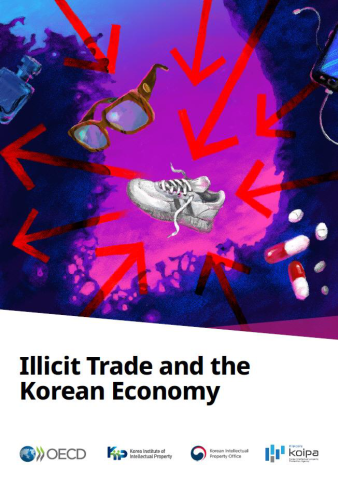Korean Companies’ Counterfeit Goods Circulate Globally Worth $9.7 Billion - 1.5% of Total Exports
Half of the Counterfeit Goods Are Electronics Mostly Originating from Hong Kong and China

The Organization for Economic Cooperation and Development (OECD) has announced that the scale of counterfeit goods infringing on Korean companies’ intellectual property rights circulating worldwide amounts to $9.7 billion (11.1 trillion KRW) as of 2021. This figure represents 1.5% of Koreas total exports for the same year.
Among the counterfeit goods distributed globally half are electronics with most of these counterfeits originating from Hong Kong and China.
On July 3 the OECD published a report titled Illicit Trade and the Korean Economy which includes these findings. The report was commissioned by the Korean Intellectual Property Office (KIPO) to analyze the economic damage caused by the distribution of counterfeit goods. This is the first time the OECD has analyzed the economic impact of counterfeit goods distribution on Korean companies.
Key Findings: Half of Korean Companies’ Counterfeit Goods Are Electronics Mainly from Hong Kong (69%) and China (17%)
The report highlights that while Korea is recognized globally as an innovative nation it is structurally vulnerable to counterfeit goods across various sectors due to its deep integration into the global value chain. The OECD analysis indicates that the distribution of counterfeit goods leads consumers to purchase fakes instead of genuine products negatively impacting Korean companies’ domestic and international sales manufacturing jobs and government tax revenue.
Global Innovation Indicators: Korea ranks 2nd among OECD countries in R&D investment relative to GDP (2019) 6th in the Global Innovation Index among 132 countries (2022) 1st in patent applications per $100 billion GDP (2022) and 1st in patent applications per million population (2021).
In 2021 the OECD estimated the scale of counterfeit goods infringing on Korean companies’ intellectual property at approximately $9.7 billion equivalent to 1.5% of Korea’s total exports. The most affected sectors were electronics (51%) textiles and clothing (20%) cosmetics (15%) miscellaneous goods (6%) and toys and games (5%). Hong Kong (69%) and China (17%) were identified as the primary sources of these counterfeit goods.
Economic Impact: $6.1 Billion in Lost Sales 10000 Jobs and $1.57 Billion in Tax Revenue
The OECD quantitatively estimated the negative impact of the spread of counterfeit goods on Korean companies domestic and international sales manufacturing jobs and government tax revenue.
Korean companies domestic and international sales losses were estimated at $6.1 billion (approximately 7 trillion KRW) accounting for 0.6% of total manufacturing sales. The most affected sectors were home appliances electronics and telecommunications equipment which suffered losses of $3.6 billion followed by the automotive sector with $1.8 billion in losses. In 2021 the total number of manufacturing jobs lost due to counterfeit goods was estimated at 13855 representing 0.7% of all manufacturing jobs.
In terms of government tax revenue the OECD estimated a loss of $1.57 billion (approximately 1.8 trillion KRW) for 2021.
KIPO’s Continued Support to Combat Overseas Intellectual Property Infringement
The government announced measures to strengthen the response to intellectual property infringement of Korean companies in the Emergency Economic Ministers Meeting in March 2023. These measures include expanding the global reach of online counterfeit product blocking focusing support on industries frequently affected by overseas counterfeit goods and establishing a public-private joint response system.
KIPO Commissioner Kim Wan-Gi stated “The distribution of counterfeit goods not only damages the brand image of individual companies but also causes serious harm to the national economy including corporate sales jobs and tax revenue. Based on the results of this OECD study we will strengthen support to minimize the impact of overseas intellectual property infringements on Korean companies.”
Website: : http://www.wip-news.com/news/articleView.html?idxno=24135
